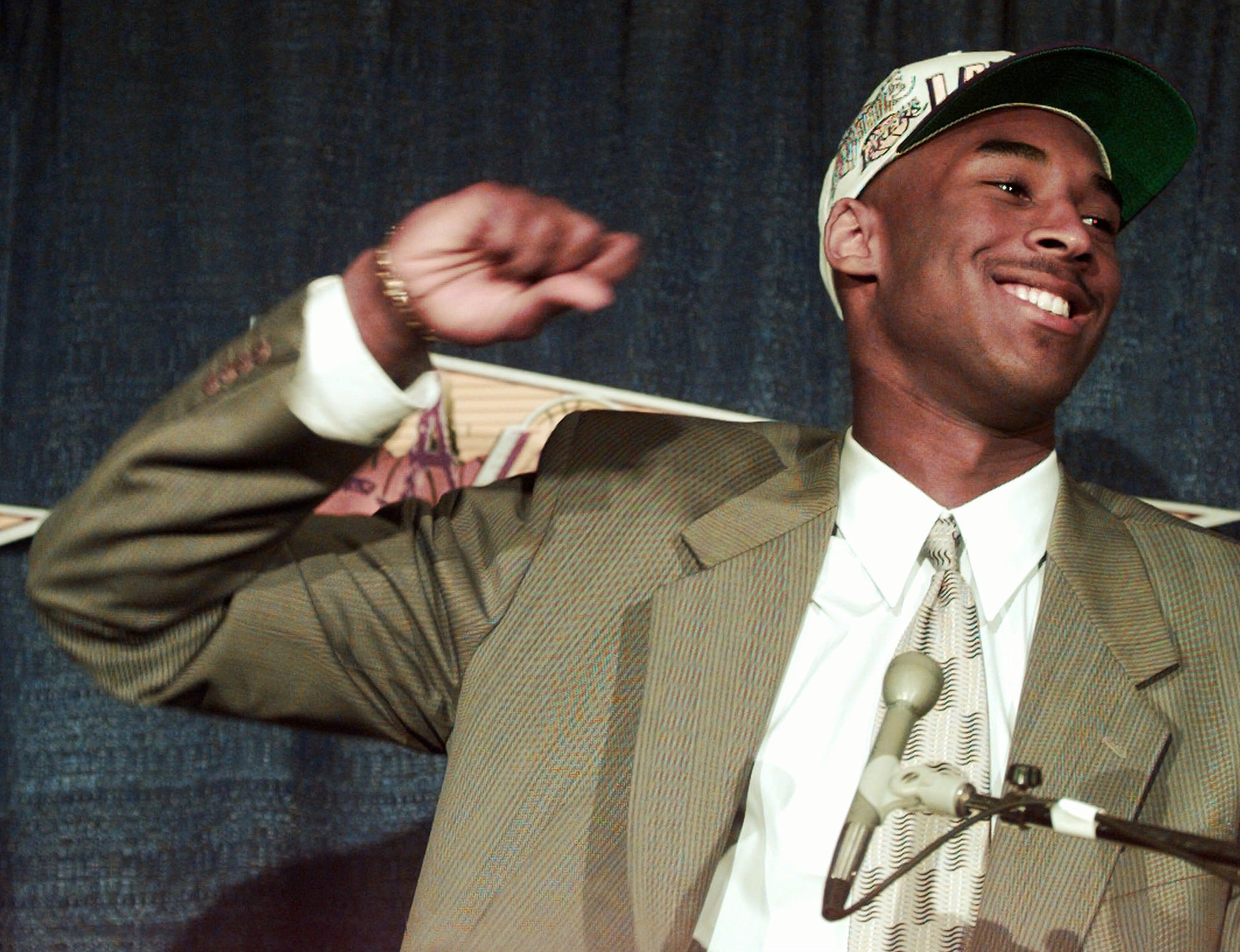LOS ANGELES — Legendary Los Angeles Lakers announcer Chick Hearn answered the phone and it was Jerry West, sounding out of breath, as if he was hyperventilating.
“Jerry, you alright?” asked Hearn. “Have you been jogging?”
“I just saw the greatest workout I’ve ever seen, and it was by a 17-year-old!," said West, then the Lakers' vice president of basketball operations.
It was the spring of 1996, and the object of West’s admiration was Kobe Bryant, a graduating senior at Lower Merion High in suburban Philadelphia.
Mitch Kupchak, currently the Lakers' general manager, was West’s assistant in those days. He, too, got a call from West, who wanted Kupchak to come to a second workout for Bryant. This time West was bringing in the heavy artillery, including Michael Cooper, the team's defensive stopper during the 1980s. By then, Cooper had been retired for six years and was 40 years old, but he still figured to be able to shut down a 17 year old.
He couldn’t.
“Great workout,” says Cooper, the image of the young Bryant still fresh in his mind 20 years later. “I had to work to hang in there.”
“Jerry’s enthusiasm was off the charts,” said Kupchak. “I could see what he was talking about.”
Word was starting to spread around the NBA about the son of former NBA player Joe “Jellybean” Bryant and that concerned agent Arn Tellum. Representing Byrant, Tellum was hoping to steer him to the Lakers, Bryant’s favorite team growing up.
To draft a player straight out of high school would require a leap of faith for any NBA team. It had worked out with players such as Moses Malone, Darryl Dawkins and Kevin Garnett, who was taken by the Minnesota Timberwolves with the fifth overall pick the previous year. But those were all big men whose size could enable them to have an immediate impact in an era when big bodies still dominated the game. Taking a 6-6 shooting guard like Bryant would be a much bigger gamble.
That was certainly the opinion of Marty Blake, then the NBA’s scouting director.
“He totally scoffed at the idea,” said Mark Heisler, then the NBA columnist for the Los Angeles Times. “Totally wrote Kobe off.”
Even Bryant had his doubts.
"Honestly, I didn’t know (if I could play in the NBA),” he told USA TODAY Sports. “I really didn’t. To me, the logic was that you go to college for the purpose of getting a job, learning, or finding your passion. I knew what my passion was. I figured, if I’m going to learn, then I’m going to learn from the best. … I knew I had the desire to continue to improve, no matter what.”
West and Tellum knew that when the Lakers drafted at No. 24, Bryant would be long gone. How far would they have to move up?
They figured the Charlotte Hornets at No. 13 were the Lakers’ best shot. Tellum’s biggest fear was that the New Jersey Nets at No. 8 would take Bryant.
With center Shaquille O’Neal about to become a free agent, West decided to offer his starting center, Vlade Divac, to the Hornets for the rights to Bryant. Moving Divac would also create cap space to be used in the pursuit of O'Neal.
But, if O’Neal, the dominant big man of his era, turned down the Lakers after they had dealt Divac, the team would be left without a center. West never wavered.
“The draft is a chess match,” said Kupchak. “We floated rumors that we were going to take somebody else to get people thinking. It’s called gamesmanship. You just hope that Kobe is there when Charlotte drafts, but you don’t know.”
Tellum engaged in a misdirection ploy of his own. Now vice chairman of the Detroit Pistons, his job then was to encourage teams to sign his clients. But in this case, he was trying to discourage inquiring general managers.
“I used my best powers of persuasion to put doubt out there,” said Tellum.
Despite all the intrigue circulating around Bryant, Tellum found him taking a nap in his hotel in the hours leading up to the draft.
“That’s why you are here, to make it happen," Bryant told Tellum.
The agent breathed a sigh of relief when the Nets took guard Kerry Kittles with the eighth selection.
When the Hornets selected Bryant at No. 13, there was euphoria in the Lakers’ draft war room. But in Europe, where Divac, a native of Serbia, heard the news, there was a different kind of reaction.
“When I realized I had to go somewhere else to play,” said Divac, who had been a Laker for seven seasons, “I was thinking about just retiring. I felt L.A. was my city.”
When Divac, then 28, told his wife, Anna, what he was thinking, she looked at him and said, “Are you stupid?”
Divac reconsidered, went to Charlotte and played nine more years in the league, rejoining the Lakers in his last season and playing alongside Bryant.
“When I came back to the Lakers and saw what Kobe means to basketball,” said Divac, now the general manager of the Sacramento Kings, “I was very happy that, in some way, I was part of it.”
West told Lakers owner Jerry Buss that they had gotten, “the No. 1 player in the draft.”
Nobody was happier than Bryant.
“It felt too good to be true,” he now says. “This doesn’t happen. You don’t grow up loving a team and then, all of a sudden, you are get drafted by that team straight out of high school. Then, I wind up playing with them for my entire career.”
CAPTURING KOBE: A photographer's best shots

![USP NBA: LOS ANGELES LAKERS AT SACRAMENTO KINGS S BKN USA CA [image : 82662282]](http://www.gannett-cdn.com/media/2016/04/05/USATODAY/USATODAY/635954655201806364-USP-NBA-Los-Angeles-Lakers-at-Sacramento-Kings.jpg)

